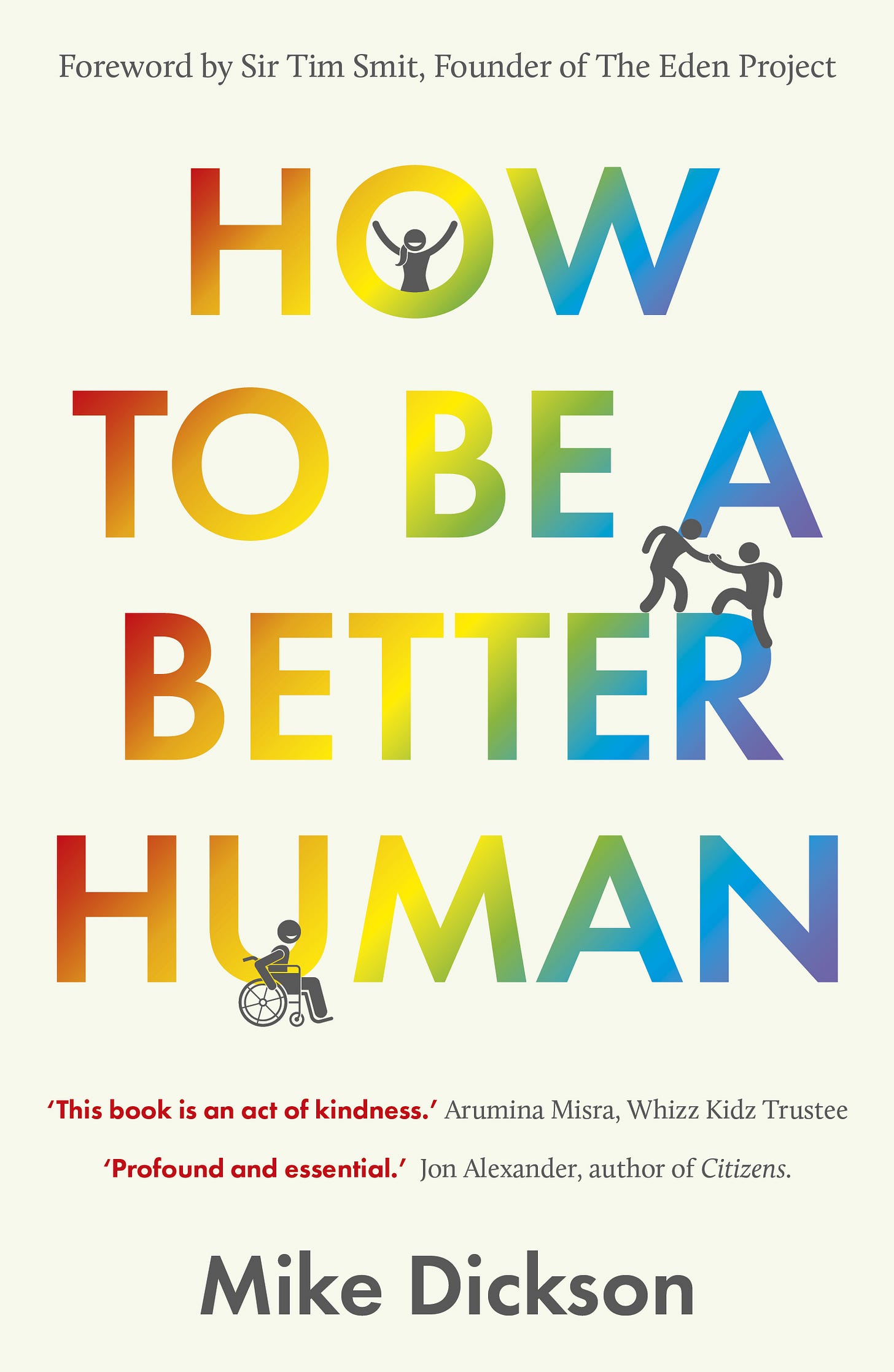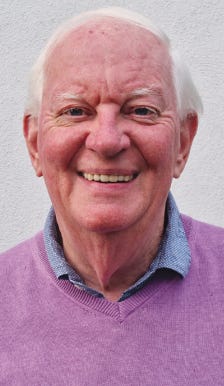How To Be A Better Human
On World Kindness Day, Byline Supplement talks to Mike Dickson, someone who truly understands the immense power of kindness
Mike Dickson is a quietly spoken man, the almost accidental co-founder and then CEO of the children’s charity Whizz-Kidz, which has raised over £150 million to provide mobility equipment for more than 26,000 disabled children and young people in the UK, while directly supporting more than 48,000 young wheelchair users to live the best possible life.
Describing himself as “an ordinary entrepreneur”, Mike also co-created, with and for Weatherbys Private Bank, a series of highly successful conferences focusing on the future world we wish to see: Creating the Future, and today he and his wife Shuna are partners in Our Generous Gene, an advisory service encouraging individuals, families, and companies to support inspirational NGOs and social enterprises making a positive difference in the UK and globally, introducing them to sources of expertise, knowledge, contacts and funds.
He loves being able to help others, especially those having a challenging time. Quietly.
His new book, to be published by Byline Books, is How To Be A Better Human, in which he distils what he’s learned over the course of 30 years about the extraordinary value of kindness. Not just to those in receipt of generosity, but also to those who gave.
Inspired by the example of his friend, the business guru and philanthropist Charles Handy, Mike and his wife Shuna began dividing their year into three parts. One third would be spent earning enough money to live on, one third doing something that interested them “like writing a book or starting a futures conference” and one third doing pro bono work, “helping people for nothing”.
He is aware that this was a lifestyle choice and is not possible for everyone “It’s perfectly alright providing you can earn a living,” he says, “You can’t walk around being creative all your life”. But for those who can afford it, he says, there is such a thing as “having enough” – you decide how much you need to live on, then, instead of simply accumulating more, you focus instead on “maximising your life, not your income” by giving time and money to projects that make a difference.
In a world dominated by power-grabbing billionaires, that feels like a radical act.
“We were lucky to be able to make that choice, and to be able to persuade a lot of people we knew to become useful,” Mike says, modestly.
But you don’t have to have money to be a better human. Everyone can do it.
‘Come and Sit in the Mud With Me’
“One of the core messages of the book is that everybody is insecure, or anxious or worrying about something, whether it’s their family, or their relationships or their work, or their finances or their health. In talks, I’ve asked the people in the audience to think of their three closest friends. Then after a minute or two of quiet, I suggested that those three friends had anxieties and worries about those sorts of things – and it follows that everyone else in the room is like that, with similar anxieties – and that the one thing you can do is to get in touch with your closest friends, reach out to them, WhatsApp them, go and have a coffee. You can go and find out how they are, and more to the point, you can actually listen to them. You’re not there to cure them, you’re there to listen. You’re not interrupting them, you’re just showing up, coming alongside people, and caring about them.”
There is, Mike thinks, a particular need for that kind of care right now. “You can’t believe how many people are going through a particularly hard time at the moment,” he says ruefully. “It’s not a class thing, it’s not a gender thing, it’s just being awake and recognising how other people are having a really hard time and saying hello.”
He likes to quote from the inspirational business leadership speaker Simon Sinek, who brilliantly expresses that need for companionship without being in “fix-it mode” as the desire to have someone to “Come sit and in the mud with me. Ask me how I’m feeling, ask me how I’m doing. Just let me vent. Just sit in the mud with me.”
“Several people suggested that that should be the title of the book,” Mike laughs. “Sometimes you can do something useful or be practically helpful, but most of the time, people just want you to be there with them.”
You Need to Be Strong to be Kind
While no-one would deny that kindness is a virtue and a common good, it is frequently seen as naïve, or even as a weakness in a world that values strength. Mike has little truck with such notions. “I just don’t agree with that, it’s absurd” he says. “You know, you need to be strong to be gentle with people. Most people can remember when somebody did something kind for them, or forgave them for something, if you ask anyone.
“The thing is, when people are in real trouble, you need to run towards them, not run away from them. And that demands a strength, a human behaviour, not soft behaviour, you are supposed to behave like a human, to be in touch and not run away.”
Reasons for Hope Now?
In these chaotic times, does Mike feel hope? Are people becoming kinder?
“The cold hard truth is that there is a huge sense of overwhelm for everybody, from the young, to everyone else, everybody is overwhelmed by wars and poverty, problems in the NHS and everything you can imagine, the news every day is relentlessly grim. But we’ve got to remember that we know there are millions of people all over the world doing fabulous things to help other people, whether it’s with refugees or education or health, or anything else.
“You can do it yourself, or you can support the people who are making a difference. You can do something”.
In the book, he retells the story of a man coming across thousands of starfish washed up on a beach and a small girl throwing them back into the sea, one by one. When he points out that there are thousands of them and questions what difference she hopes to make, the girl throws another starfish back in the sea and replies, “Well, it made a difference to that one.”
“You can make a difference to a neighbour, or a charity helping children, or you can help the people who are doing it.”
Mike points to two central themes of the book: Firstly, that “Everybody is all over the place and we need to get out and help them and sit beside them and recognise that we all have our insecurities and worries.” And secondly that “We are all overwhelmed and all fed up but we can actually do something ourselves.”
A Sense of Agency
How to be a Better Human is deliberately framed not as a ‘self-help’ book but as a ‘help others’ book. Mike’s aim is to give readers a powerful sense of agency and purpose.
For that reason, he says, “I wanted it to be short, I wanted it to be inspirational, I wanted people to learn from it, and then I wanted people to do things, so at the end, there isn’t an appendix, there’s an action list of 15 things you can do to go and be useful.”
He is mobilising an army of helpers to spread the message the book communicates. “But it’s not for me. I’m not in this for me, I’m in it for everybody else’s ideas on how to do it.”
The Golden Rule
Helping others, Mike points out, is a central tenet of all the world’s religions. He was inspired by his friend Kim Polman, who was working on a book about The Golden Rule:
“She studied the Golden Rule throughout all faiths and religions around the world, and of all the 8 billion or so people in the world, around 75% of them belong to one or other of the major faiths – Christianity, Islam, Judaism, Hinduism, Buddhism – along with countless indigenous cultures, all have their own version of the Golden Rule. Which is basically, do unto others as you would have done to you.
“One of the major teachings of all of them is that you are supposed to look after those who are less fortunate than yourself. It goes all the way back to the Ancient Egyptians; we are supposed to behave properly, I didn’t make this up! It happens to be a common form of behaviour. The fact that people don’t behave properly, and create wars and such like, is nevertheless not the teaching of Islam or Christianity or Judaism or the Hindu faith.”
“We are unbelievably blessed to be able to do this,” Mike says, “to see the best in people and to be able to support people and be in the mud with them, and why wouldn’t you want to do that?”
Why indeed.
How To Be a Better Human offers a wealth of ideas and inspiration on how to live with purpose, hope and heart. It is a timely reminder that living well isn’t about money, status or brilliance, but about the simple choice to care.
Kindness still counts.
How To Be A Better Human by Mike Dickson is published on 20 November by Byline Books, and will ship well in time for Christmas. Order your copy today and start the holiday season with a little more hope.



